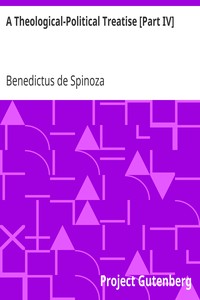| Author |
Spinoza, Benedictus de, 1632-1677 |
| Translator |
Elwes, R. H. M. (Robert Harvey Monro), 1853- |
| Title |
A Theological-Political Treatise [Part IV]
|
| Note |
Wikipedia page about this book: https://en.wikipedia.org/wiki/Tractatus_Theologico-Politicus
|
| Note |
Reading ease score: 50.5 (10th to 12th grade). Somewhat difficult to read.
|
| Credits |
Joseph B. Yesselman. HTML version by Al Haines.
|
| Summary |
"A Theologico-Political Treatise [Part IV]" by Baruch Spinoza is a philosophical treatise written in the late 17th century. This part of the work examines the foundations of state governance, the natural and civil rights of individuals, and the complex relationship between religion and sovereign authority. Through these discussions, Spinoza explores the implications of political power and the role of individuals within a society organized under a sovereign, with particular references to historical examples such as the Hebrew republic. The opening of the treatise introduces key concepts of natural rights and the authority of the sovereign while articulating a framework for understanding governance. It emphasizes that individuals retain certain rights even when they submit to state power, asserting that the existence of a sovereign does not eliminate personal agency. Spinoza discusses the transition from a state of nature to civil society, outlining how individuals, motivated by self-preservation, collectively agree to form a government that acts in the interests of the citizenry. This section sets the foundation for the subsequent arguments regarding the nature of authority, the relationship between divine law and sovereign power, and the rights of individuals in a political and religious context. (This is an automatically generated summary.)
|
| Language |
English |
| LoC Class |
B: Philosophy, Psychology, Religion
|
| Subject |
Philosophy and religion -- Early works to 1800
|
| Subject |
Free thought -- Early works to 1800
|
| Subject |
Political science -- Early works to 1800
|
| Category |
Text |
| EBook-No. |
992 |
| Release Date |
Jul 16, 1997 |
| Most Recently Updated |
Jan 23, 2021 |
| Copyright Status |
Public domain in the USA. |
| Downloads |
179 downloads in the last 30 days. |
|
Project Gutenberg eBooks are always free!
|

